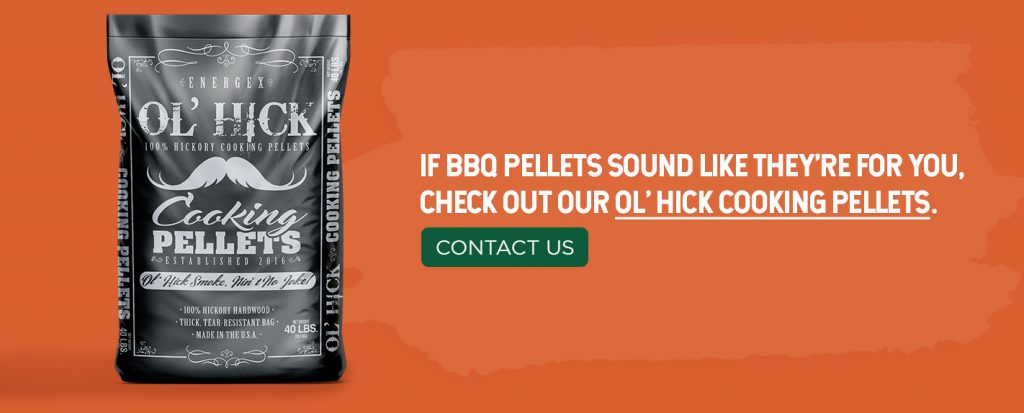Pellet Grills vs. Charcoal vs. Propane vs. Wood Chips
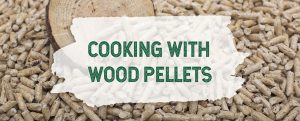
Barbecuing is one of the most popular pastimes in the United States. According to the Hearth, Patio and Barbecue Association, a whopping 80% of American homeowners own a grill or smoker. A similar number of Americans planned on grilling beef on the Fourth of July alone.
For many years, these buyers only had two main options: charcoal grills or propane grills. Some may have had an electric grill if they lived somewhere that did not allow grills.
Over the last decade, however, we have seen the resurgence of another kind of grill and cooking fuel – wood pellets. Although wood pellets and wood pellet grills have been around for about 30 years, improvements in technology and competition have led to wider acceptance and affordability. More Americans are choosing to grill with wood pellets for a variety of reasons including increased flavor and more convenience.
As a result, you’re seeing more pellet grills showing up at tailgates, festivals, and backyard barbecues.
BBQ Pellets vs. Charcoal Grills | Using BBQ Pellets On A Charcoal Grill | BBQ Pellets vs. Propane | BBQ Pellets vs. Wood Chips
Barbecue Wood Pellets Basics
Wood pellets are currently used for two main purposes — heating and grilling. There are significant differences between the two:
- Heating pellets are used to heat homes. They should never be used for grilling or any kind of cooking. Heating pellets are constructed from pressed hardwood and softwood wood residues. They aren’t typically food safe and can impart unpleasant and dangerous chemicals into whatever you’re grilling.
- BBQ pellets are wood pellets specially prepared for pellet grills and smokers. They are composed of 100 percent compressed hardwood woodchips or sawdust. The sawdust and pulverized wood are put through a rotating die under tremendous heat and pressure which extrudes a uniform density. Lignin, a naturally occurring element in wood, binds the pellets together. When you cook with wood pellets, you give your food a true hardwood, smoky flavor and you have much more control over how you cook your food than with many other forms of grilling.
- BBQ pellets are also extremely efficient. When you compare them to other forms of fuel for a barbecue, BBQ pellets will transform about 90 percent of their contained energy into heat that you can use.
- Cooking with BBQ pellets is very safe. At Energex, we manufacture our barbecue wood pellets with 100 percent wood. And we offer a variety of flavors including applewood bbq pellets, hickory bbq pellets and bourbon bbq pellets from Jim Beam bourbon barrels.
- BBQ pellets are a very environmentally friendly grilling choice. Natural gas and propane are fossil fuels, while wood pellets are made from a renewable resource. Wood pellets will not emit any petrochemicals when burning.
Grilling With BBQ Pellets vs. Older Grilling Methods
When you use 100 percent natural BBQ pellets to grill, you’re taking a step up from grilling with some older methods. Here’s how they stack up:
- Charcoal, which has been the most popular grilling choice of flavor enthusiasts for many years, takes longer to heat up, is harder to control and leaves a big mess. You’ll need to keep a close eye on it to control the temperature.
- Propane or gas grilling offers more control and is great for searing meat, but it’s hard to judge if you have enough propane or gas left in your tank for a complete cookout. Most propane grilling units take up a great deal of space on your deck or patio because they need to be a certain distance away from any structure. They also leave your food with a petroleum taste, which no one really wants. Propane and natural gas have some unique safety concerns, and refilling propane tanks can be a hassle.
- Wood chips deliver the natural smoke flavor you can get with wood pellets, but they burn quickly and only provide the smoke you need to flavor your meat properly at lower temperatures. Their short burn times mean wood chips rely on other heating sources, such as propane, to cook the food.
- BBQ pellets can give you that wonderful, smoky, natural hardwood flavor whether you are grilling or smoking food. They provide a more consistent temperature and don’t flare up like charcoal or gas, so they don’t need you to stand by the grill constantly while your food is cooking to see if it’s burning. Pellet grills tend to be more energy-efficient and clean-burning, too. The pellets themselves are made from 100% wood.
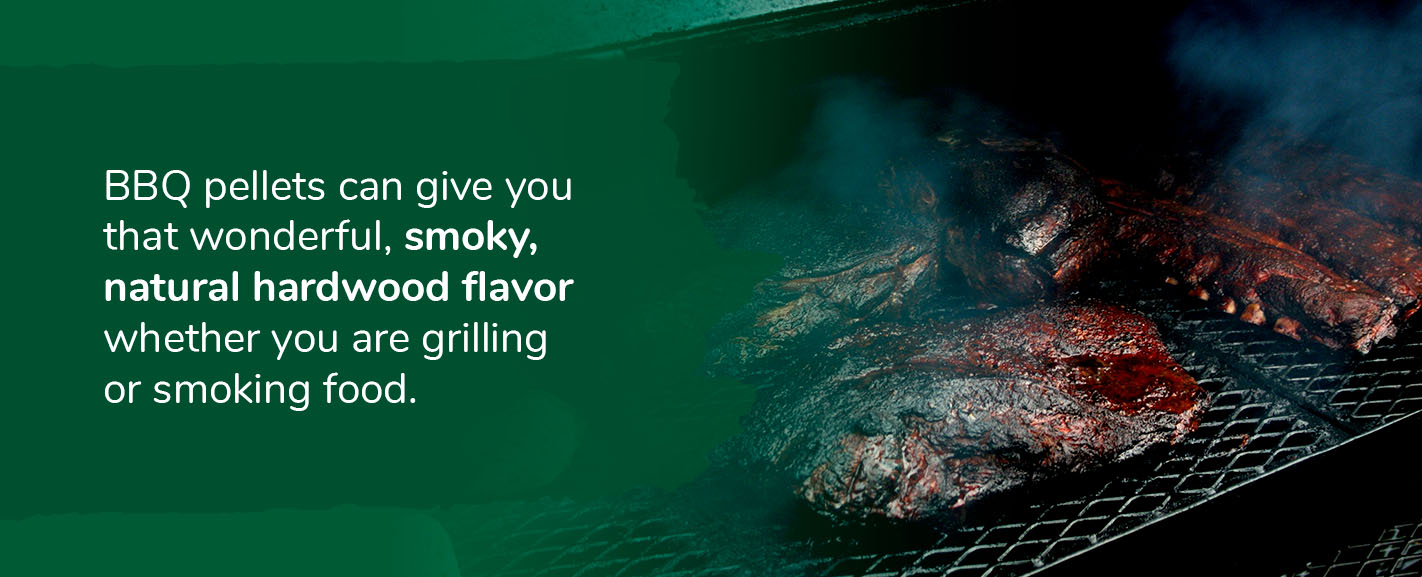
Let’s look more closely at BBQ pellets as a grilling choice versus other popular grilling methods.
Wood Pellets vs. Charcoal Grills
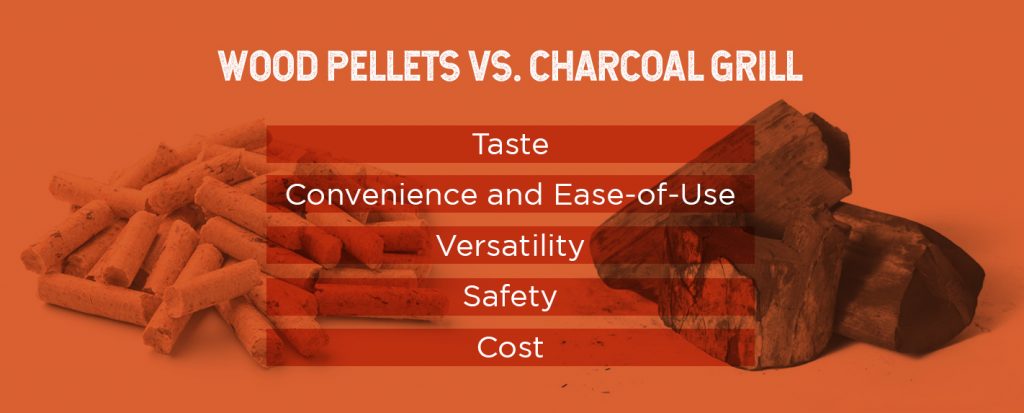
As we noted above, charcoal is currently the most popular grilling material for backyard pitmasters that enjoy flavor — but that lead seems to be dwindling. Wood pellet grilling has jumped threefold in just a couple of years, with almost one in 10 grillers now using this impressive fuel source in their grilling. When looking at wood pellets vs. charcoal, wood pellets offer a lot of advantages.
1. Taste
If the taste of your food is one of the main reasons you grill, BBQ pellets should be your first choice. They provide a much better flavor than charcoal, especially when charcoal burners use lighter fluid to start their coals. When you grill with wood pellets, you give your food a strong, smoky flavor. You also have specific options based on the flavors you like, such as oak and applewood. Energex Ol’ Hick pellets, for example, are made of 100% hickory or 100% applewood for perfect smokiness.
Wood pellets also tend to be easier to use, since there is a lower chance of overcooking using a wood pellet grill. They also help lock more of the natural moisture into the meat or fish — another great way to improve flavor.
Americans are very familiar with the taste and flavor of charcoal. However, when given a chance to barbecue with wood pellets, they find the food is delicious and tender, and it’s hard to beat that wonderful flavor.
2. Convenience and Ease of Use
When you grill with charcoal, it can be a pain to start. Once started, it requires your constant attention because you don’t want your food to burn or the charcoal to flare up too much. When you use a wood pellet grill, you push a button to start, then set the temperature where you know it will give you the flavor that you want and the tenderness that you desire.
After a short heat-up process, you’re ready to grill. These grills are also much easier to clean since the pellets burn neatly and have low ash contents.
Wood pellets have the benefit of allowing you to leave the grill and do other activities like preparing other food that you may be serving at your barbecue. A wood pellet grill burns with consistent heat, so you never have to worry about the grill getting too hot or the wood pellets flaring up, burning your meat or fish and making it tough and unpleasant.
3. Versatility
When you buy a wood pellet grill, it’s like you’re getting a smoker for free. You can use your wood pellet grill to barbecue, grill, roast, bake, smoke, and even sear. That’s because the ability of a wood pellet grill to cook your food at a consistent temperature allows you to use all these different methods.
Most charcoal grills will smoke, barbecue, grill, and sear and that’s about it. Charcoal grills lack the versatility of a wood pellet grill. This characteristic is especially important if you like to experiment with your barbecue and use it for cooking in a variety of ways.
4. Safety
Charcoal grills have unpredictable flames and a fuel source that requires consistent monitoring until the heat dies down. Even when you’re finished grilling, you still need to keep an eye on the hot coals. When you use a wood pellet grill, you simply turn the grill off, and there are no more concerns or wasted fuel.
5. Cost
It would be foolish to say that you can’t get a charcoal grill for a reasonable price. Small grills sell for as little as $30, but most people prefer larger grills.
In the past, wood pellet grills were more expensive than charcoal grills. But with the advances in technology made by wood pellet grills, along with competition, the costs are relatively similar. The actual difference in price depends on which model you choose. For instance, you can buy a pellet grill where you could use your smartphone to control the temperature.
Then there’s the question of fuel. Lump charcoal is relatively inexpensive, but if you barbecue frequently, the cost of charcoal adds up quickly. If, on the other hand, you purchase a 20-pound bag of wood pellets, it can last five times longer than a comparable bag of charcoal because wood pellets burn more slowly.
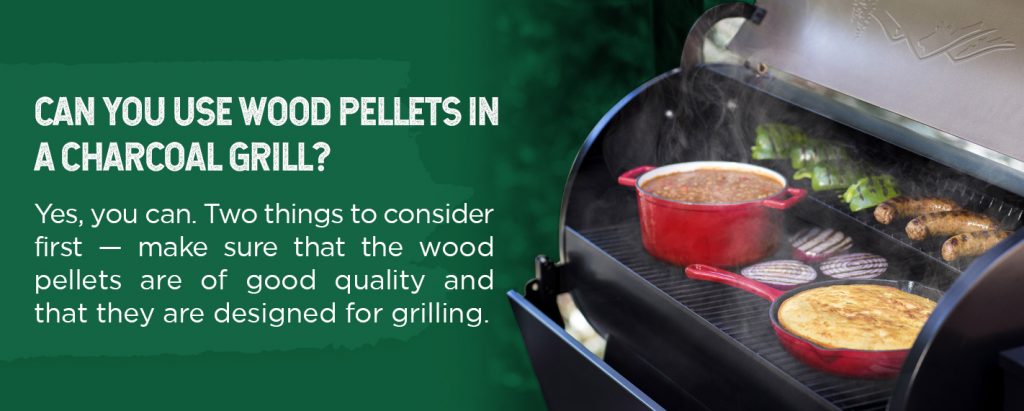
Can You Use BBQ Pellets in a Charcoal Grill?
Yes, you can. Two things to consider first — make sure that the wood pellets are of good quality and that they are designed for grilling. Look for pellets made of 100% wood, with low ash content and high quality standards.
Using wood pellets with your charcoal grill is relatively easy:
- Prepare and start your charcoal grill as usual.
- Once the charcoal is hot and has a layer of white ash, place a handful of wood pellets under the rock grate.
- Once the wood pellets ignite, you can begin to grill.
- If you want to enjoy the full smoky flavor of wood pellets, keep the lid closed tight.
Another option is using a pellet tube smoker, such as the A-Maze-N Tubes. It contains the wood pellets that you can then mix in with your charcoal. This model is a great idea if you’re planning to cook more than one kind of meat at the same time, for instance, hamburger and pork chops. It provides the right amount of smoke to add the flavor that you want to your food.
Plus, this pellet tube smoker is an inexpensive way to give that natural hardwood flavor to your meat or fish using your charcoal grill.
If you’re looking for a fast grilling solution, you can make a pouch out of aluminum foil with pellets inside. Poke a few holes in the foil for airflow and set on the coals.
BBQ Pellets vs. Propane
The other most popular form of fuel used for grilling and barbecuing is propane or natural gas. Once again, BBQ pellets hold up well in a direct comparison. When you look at BBQ pellets vs. propane grills, BBQ pellets are the big winner.
1. Taste
Once again, you cannot compare the taste of meat or fish prepared in a wood pellet grill vs. a gas grill. Propane or gas grills can’t give you the smoky, natural hardwood flavor that makes your meat so delicious and tender. Meat cooked on a propane grill tastes like cooked meat with a little petroleum, period. If you want to give it any flavor, you have to add a lot of spices and rubs. Wood pellets provide that 100 percent wood-cooked flavor on their own.
If you spend a few years grilling over wood, with BBQ pellets, and go back to a propane grill, you will taste the propane.
2. Convenience and Ease of Use
If you don’t grill or barbecue as often using a propane grill, it’s hard to judge how much fuel you have left in your propane tank. You can never be sure how much propane you have left in the tank and could run out halfway through your grilling party. If you use a wood pellet grill, it’s easy to see when you need to add more wood pellets, and you always know how much is in the auger that leads into the burn pot.
A propane or gas grill definitely heats up much faster than a charcoal grill. It’s also much easier to control the temperature with a propane grill.
You can dial the amount of propane being used up or down depending on what temperature you want to use. Even so, it’s still easier to use a wood pellet grill. Remember, wood pellet grills allow you to set a temperature to cook your food, rather than adjusting the amount of gas. You will spend less time trying to figure out the temperature of your grill when you use a wood pellet grill.
Wood pellet grills and propane grills both share the ability to turn on with the flick of a switch or the push of a button.
3. Versatility
A wood pellet grill acts as both a grill and a smoker, which allows you to cook a wide variety of meat and fish in different ways. A propane grill is a grill. Because they have certain ventilation requirements, propane and gas grills cannot trap and maintain heat to be used as smokers.
4. Safety
Natural gas and propane can be very dangerous materials if not handled correctly. Whether you’re using tanks or connecting directly to a natural gas line, there’s always a risk of explosions and spills. Be aware of these potential events and stay up-to-date with your local regulations regarding gas grills.
Propane grills are quite large, so they take up a fair amount of space on your deck or in your backyard. They also need to be placed away from your house because of those hazards they present.
5. Cost
Wood pellet grills were more expensive than propane/natural gas grills in the past. Once again, however, advances in technology and competition have resulted in a wood pellet grill that is much more comparable in cost to its propane/natural gas counterpart.
Since wood pellet grills operate on electricity, your operating cost will depend upon how much your electricity costs and how hot you want to cook your food. If you cook at about 250° F, a 20-pound bag of wood pellets can last about 40 hours. Propane is also relatively inexpensive, but more expensive than BBQ pellets. A 20-pound tank of propane may only provide about 20 hours of cooking time.
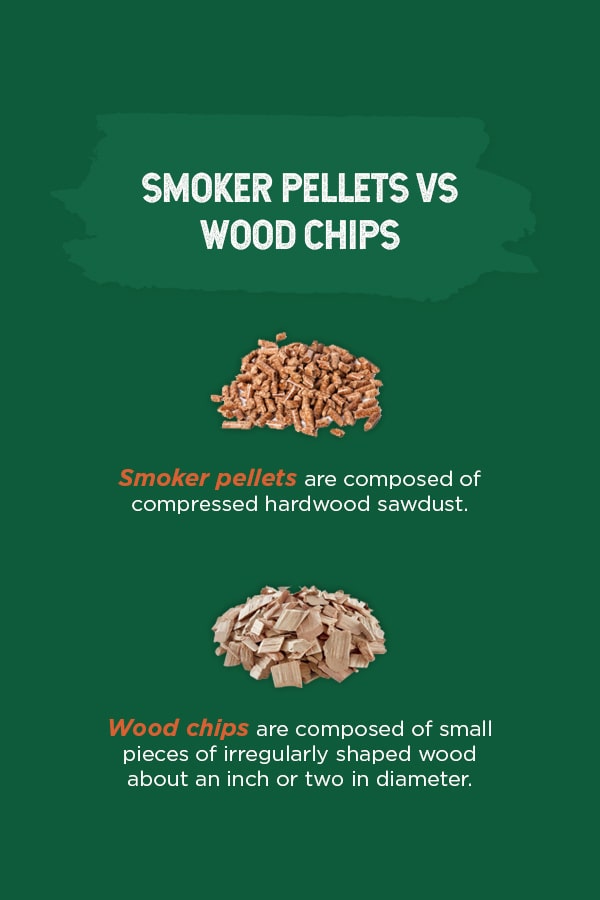
BBQ Pellets vs. Wood Chips
BBQ pellets and wood chips can all be manufactured from any type of hardwood. The main difference between the three is the amount of processing required.
BBQ pellets are composed of compressed hardwood sawdust. It is dried first so that it has a consistent moisture level and then pressed into its pellet shape. Pellets don’t burn as fast as wood chips and give you a deeper smoke flavor. They also burn at much higher temperatures than wood chips and can be used to cook more kinds of meat.
Wood chips do not require as much processing. They are composed of small pieces of irregularly shaped wood about an inch or two in diameter and have a higher moisture content than BBQ pellets. Not all moisture is removed, otherwise the woodchips would be too dry and not produce any smoke or flavor. They burn very quickly and only offer a moderate amount of smoke, but not the clean smoke you are looking for in your smoker.
1. Taste
Both of these grilling materials offer a naturally smoky flavor, but that taste varies in intensity depending on the particular material you use and whether or not it has any flavoring. For instance, as we noted above, BBQ pellets are available in hickory, apple and bourbon oak flavors. Wood chips are often unflavored.
It can also be harder to achieve a good cook with wood chips since they burn faster and less consistently. They’re also not a good idea if you’re smoking your meats because they can add a bitter taste.
2. Convenience and Ease of Use
Both materials may be easy to use, but wood chips are more difficult than wood pellets. The biggest difference between the two is that smoker pellets provide a more controlled burn. You can set the temperature and not worry about using your fuel too quickly. With wood chips, you have to regularly check to see if you need to add more material and adding more materials may not be easy with the smoker already hot.
Wood chips also require some extra care. Some grillers like to soak their wood chips, which prevents the meats from drying out, but the extra step calls for more preparation. Wood pellets don’t need this effort, and they also don’t produce much ash, which reduces your cleanup time.
3. Cost
The cost of the two materials is relatively similar. Overall, smoker pellets are less expensive per pound than wood chips. You’ll need to buy pellets in larger quantities, but you would use those quantities over a longer period, helping you save more money in the long run.
For More Information on Using BBQ Pellets, Contact Energex — Ol’ Hick
If BBQ pellets sound like they’re for you, check out our Ol’ Hick cooking pellets. Do you have any questions? You can call us at 1-717-436-2400 or contact us online. You can also reach out to find where you can purchase wood pellets or how to become a dealer for Energex.


